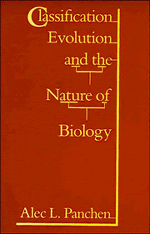Book contents
- Frontmatter
- Contents
- Acknowledgements
- CHAPTER 1 INTRODUCTION
- CHAPTER 2 PATTERNS OF CLASSIFICATION
- CHAPTER 3 PATTERNS OF PHYLOGENY
- CHAPTER 4 HOMOLOGY AND THE EVIDENCE FOR EVOLUTION
- CHAPTER 5 GEOLOGICAL AND GEOGRAPHICAL EVIDENCE
- CHAPTER 6 METHODS OF CLASSIFICATION: THE DEVELOPMENT OF TAXONOMY
- CHAPTER 7 METHODS OF CLASSIFICATION: PHENETICS AND CLADISTICS
- CHAPTER 8 METHODS OF CLASSIFICATION: THE CURRENT DEBATE
- CHAPTER 9 CLASSIFICATION AND THE RECONSTRUCION OF PHYLOGENY
- CHAPTER 10 IS SYSTEMATICS INDEPENDENT?
- CHAPTER 11 MECHANISMS OF EVOLUTION: DARWINSM AND ITS RIVALS
- CHAPTER 12 MECHANISMS OF EVOLUTION: THE SYNTHETIC THEORY
- CHAPTER 13 SCIENTIFIC KNOWLEDGE
- CHAPTER 14 PHILOSOPHY AND BIOLOGY
- References
- Author index
- Subject index
CHAPTER 13 - SCIENTIFIC KNOWLEDGE
Published online by Cambridge University Press: 03 May 2011
- Frontmatter
- Contents
- Acknowledgements
- CHAPTER 1 INTRODUCTION
- CHAPTER 2 PATTERNS OF CLASSIFICATION
- CHAPTER 3 PATTERNS OF PHYLOGENY
- CHAPTER 4 HOMOLOGY AND THE EVIDENCE FOR EVOLUTION
- CHAPTER 5 GEOLOGICAL AND GEOGRAPHICAL EVIDENCE
- CHAPTER 6 METHODS OF CLASSIFICATION: THE DEVELOPMENT OF TAXONOMY
- CHAPTER 7 METHODS OF CLASSIFICATION: PHENETICS AND CLADISTICS
- CHAPTER 8 METHODS OF CLASSIFICATION: THE CURRENT DEBATE
- CHAPTER 9 CLASSIFICATION AND THE RECONSTRUCION OF PHYLOGENY
- CHAPTER 10 IS SYSTEMATICS INDEPENDENT?
- CHAPTER 11 MECHANISMS OF EVOLUTION: DARWINSM AND ITS RIVALS
- CHAPTER 12 MECHANISMS OF EVOLUTION: THE SYNTHETIC THEORY
- CHAPTER 13 SCIENTIFIC KNOWLEDGE
- CHAPTER 14 PHILOSOPHY AND BIOLOGY
- References
- Author index
- Subject index
Summary
In Chapter 6,1 discussed the contribution that the writings of Plato and Aristotle made to the development of taxonomy. But we saw that the method of logical division was a method of gaining and systematising knowledge, not an exercise in systematics. We also saw that idealism derives from Plato. In its extreme form, developed in his later writings, “forms” or Ideas - concepts derived from the common feature of many phenomena (such as “beauty”) - not only were real but were the only safe knowledge ἐπιστήμη (episteme). All data acquired directly by the senses were suspect, deceptive, or even illusory and thus could be expressed only as “opinions” (doxa). The parallel with modern taxonomy was to attribute some sort of reality to archetypes or Baupläne as originally developed in the morphology of Geoffroy Saint Hilaire, the Naturphilosophen and Richard Owen. I contrasted this with essentialism, derived from Aristotle 's further development of logical division, which in taxonomy asserts that every taxon has an essence, a character, or series of characters that validate its reality independently of any explanatory theory such as phylogeny.
In order to lay a foundation for what I have to say about the nature of biology in the next and final chapter, I now have to draw on two other realms of discourse that can be traced back to the ancient Greeks. The first involves induction and deduction, the second causality. Plato believed that Ideas could be discovered by a purely rational process, the dialectic.
- Type
- Chapter
- Information
- Classification, Evolution, and the Nature of Biology , pp. 298 - 322Publisher: Cambridge University PressPrint publication year: 1992



